Literature Review on Mandatory Overtime Effects on Nursing Staff
VerifiedAdded on 2023/05/30
|9
|2223
|141
Literature Review
AI Summary
This literature review examines the contentious issue of mandatory overtime in nursing, drawing upon various articles to highlight its effects on nurses' well-being, patient care, and professional responsibilities. It discusses the exhaustion and decreased productivity associated with extended working hours, primarily driven by nursing shortages in Canadian hospitals. While some sources acknowledge the financial benefits of overtime for nurses, the review critically assesses the ethical implications and potential compromises to patient safety. It also addresses the conflict between nurses' autonomy and the perceived professional misconduct of declining overtime shifts. The review concludes by emphasizing the importance of protecting nurses' welfare and advocating for policies that prioritize their health and well-being within the healthcare system. Desklib provides access to this and many other solved assignments for students.
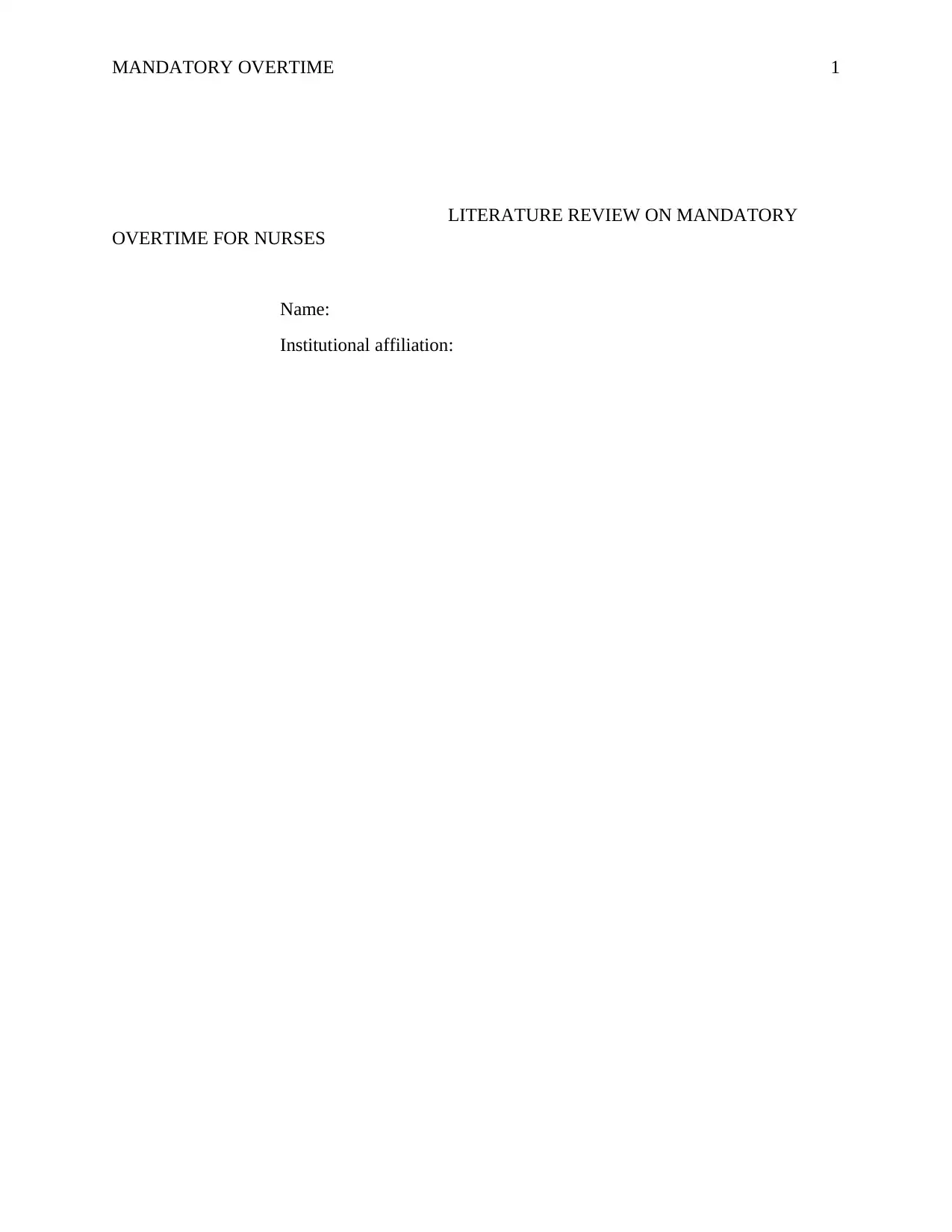
MANDATORY OVERTIME 1
LITERATURE REVIEW ON MANDATORY
OVERTIME FOR NURSES
Name:
Institutional affiliation:
LITERATURE REVIEW ON MANDATORY
OVERTIME FOR NURSES
Name:
Institutional affiliation:
Paraphrase This Document
Need a fresh take? Get an instant paraphrase of this document with our AI Paraphraser
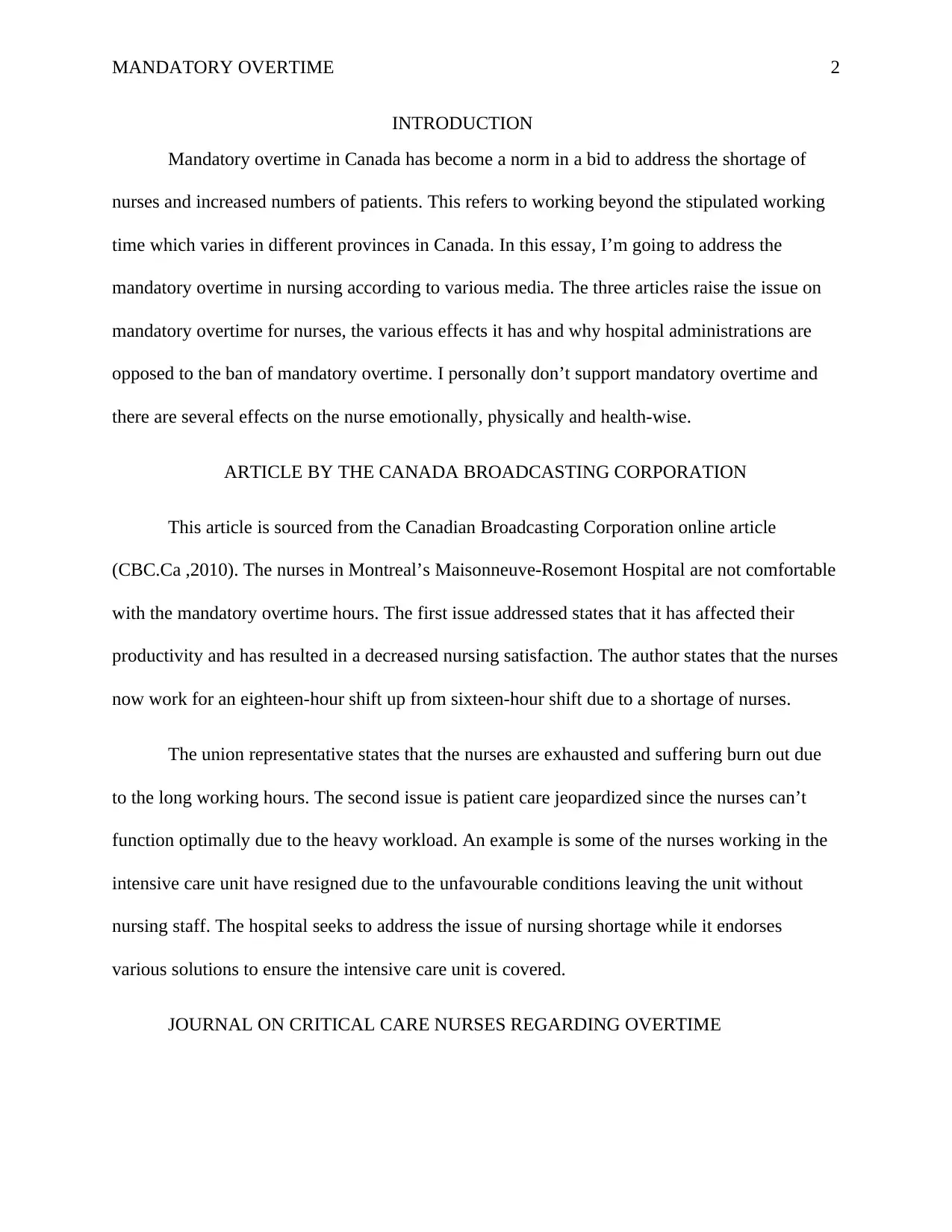
MANDATORY OVERTIME 2
INTRODUCTION
Mandatory overtime in Canada has become a norm in a bid to address the shortage of
nurses and increased numbers of patients. This refers to working beyond the stipulated working
time which varies in different provinces in Canada. In this essay, I’m going to address the
mandatory overtime in nursing according to various media. The three articles raise the issue on
mandatory overtime for nurses, the various effects it has and why hospital administrations are
opposed to the ban of mandatory overtime. I personally don’t support mandatory overtime and
there are several effects on the nurse emotionally, physically and health-wise.
ARTICLE BY THE CANADA BROADCASTING CORPORATION
This article is sourced from the Canadian Broadcasting Corporation online article
(CBC.Ca ,2010). The nurses in Montreal’s Maisonneuve-Rosemont Hospital are not comfortable
with the mandatory overtime hours. The first issue addressed states that it has affected their
productivity and has resulted in a decreased nursing satisfaction. The author states that the nurses
now work for an eighteen-hour shift up from sixteen-hour shift due to a shortage of nurses.
The union representative states that the nurses are exhausted and suffering burn out due
to the long working hours. The second issue is patient care jeopardized since the nurses can’t
function optimally due to the heavy workload. An example is some of the nurses working in the
intensive care unit have resigned due to the unfavourable conditions leaving the unit without
nursing staff. The hospital seeks to address the issue of nursing shortage while it endorses
various solutions to ensure the intensive care unit is covered.
JOURNAL ON CRITICAL CARE NURSES REGARDING OVERTIME
INTRODUCTION
Mandatory overtime in Canada has become a norm in a bid to address the shortage of
nurses and increased numbers of patients. This refers to working beyond the stipulated working
time which varies in different provinces in Canada. In this essay, I’m going to address the
mandatory overtime in nursing according to various media. The three articles raise the issue on
mandatory overtime for nurses, the various effects it has and why hospital administrations are
opposed to the ban of mandatory overtime. I personally don’t support mandatory overtime and
there are several effects on the nurse emotionally, physically and health-wise.
ARTICLE BY THE CANADA BROADCASTING CORPORATION
This article is sourced from the Canadian Broadcasting Corporation online article
(CBC.Ca ,2010). The nurses in Montreal’s Maisonneuve-Rosemont Hospital are not comfortable
with the mandatory overtime hours. The first issue addressed states that it has affected their
productivity and has resulted in a decreased nursing satisfaction. The author states that the nurses
now work for an eighteen-hour shift up from sixteen-hour shift due to a shortage of nurses.
The union representative states that the nurses are exhausted and suffering burn out due
to the long working hours. The second issue is patient care jeopardized since the nurses can’t
function optimally due to the heavy workload. An example is some of the nurses working in the
intensive care unit have resigned due to the unfavourable conditions leaving the unit without
nursing staff. The hospital seeks to address the issue of nursing shortage while it endorses
various solutions to ensure the intensive care unit is covered.
JOURNAL ON CRITICAL CARE NURSES REGARDING OVERTIME
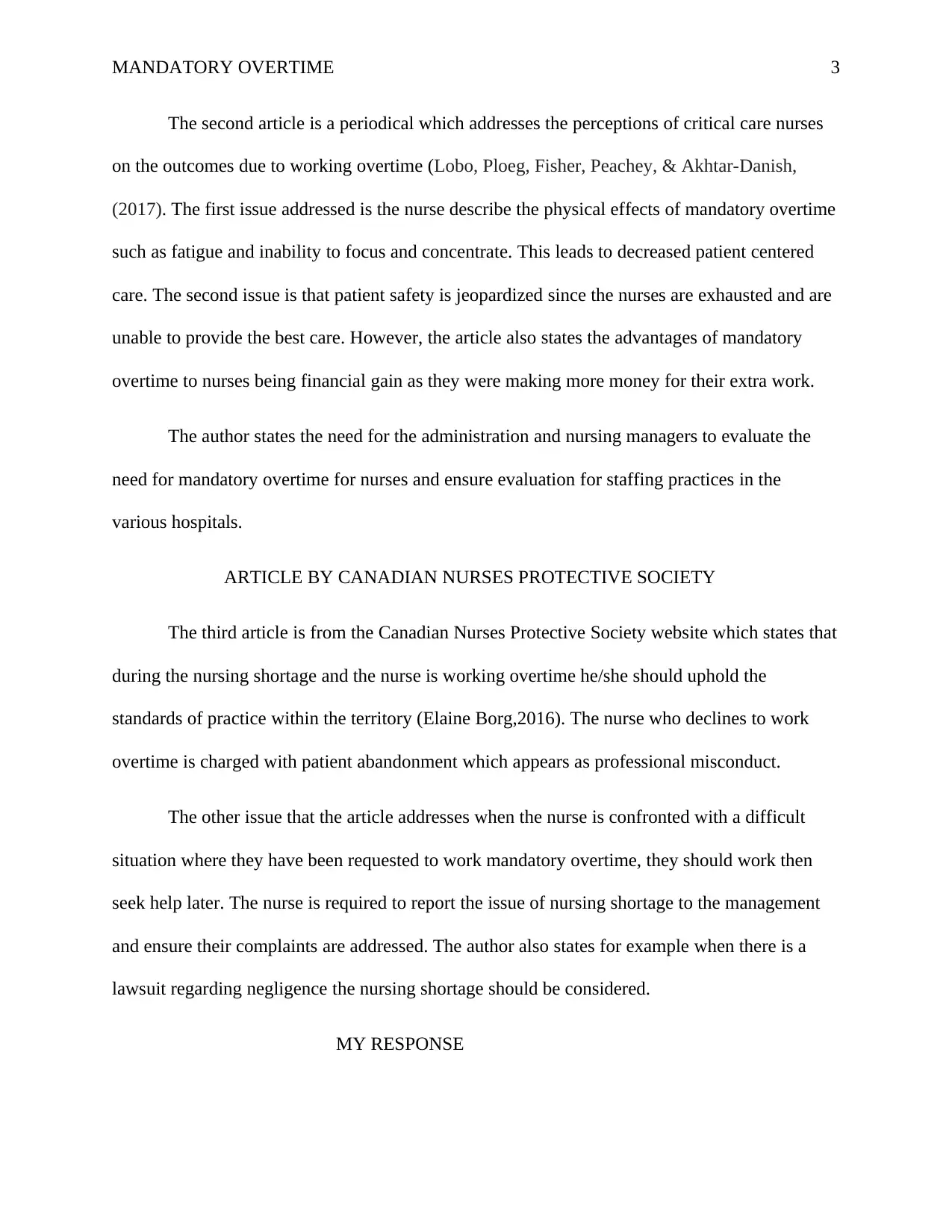
MANDATORY OVERTIME 3
The second article is a periodical which addresses the perceptions of critical care nurses
on the outcomes due to working overtime (Lobo, Ploeg, Fisher, Peachey, & Akhtar-Danish,
(2017). The first issue addressed is the nurse describe the physical effects of mandatory overtime
such as fatigue and inability to focus and concentrate. This leads to decreased patient centered
care. The second issue is that patient safety is jeopardized since the nurses are exhausted and are
unable to provide the best care. However, the article also states the advantages of mandatory
overtime to nurses being financial gain as they were making more money for their extra work.
The author states the need for the administration and nursing managers to evaluate the
need for mandatory overtime for nurses and ensure evaluation for staffing practices in the
various hospitals.
ARTICLE BY CANADIAN NURSES PROTECTIVE SOCIETY
The third article is from the Canadian Nurses Protective Society website which states that
during the nursing shortage and the nurse is working overtime he/she should uphold the
standards of practice within the territory (Elaine Borg,2016). The nurse who declines to work
overtime is charged with patient abandonment which appears as professional misconduct.
The other issue that the article addresses when the nurse is confronted with a difficult
situation where they have been requested to work mandatory overtime, they should work then
seek help later. The nurse is required to report the issue of nursing shortage to the management
and ensure their complaints are addressed. The author also states for example when there is a
lawsuit regarding negligence the nursing shortage should be considered.
MY RESPONSE
The second article is a periodical which addresses the perceptions of critical care nurses
on the outcomes due to working overtime (Lobo, Ploeg, Fisher, Peachey, & Akhtar-Danish,
(2017). The first issue addressed is the nurse describe the physical effects of mandatory overtime
such as fatigue and inability to focus and concentrate. This leads to decreased patient centered
care. The second issue is that patient safety is jeopardized since the nurses are exhausted and are
unable to provide the best care. However, the article also states the advantages of mandatory
overtime to nurses being financial gain as they were making more money for their extra work.
The author states the need for the administration and nursing managers to evaluate the
need for mandatory overtime for nurses and ensure evaluation for staffing practices in the
various hospitals.
ARTICLE BY CANADIAN NURSES PROTECTIVE SOCIETY
The third article is from the Canadian Nurses Protective Society website which states that
during the nursing shortage and the nurse is working overtime he/she should uphold the
standards of practice within the territory (Elaine Borg,2016). The nurse who declines to work
overtime is charged with patient abandonment which appears as professional misconduct.
The other issue that the article addresses when the nurse is confronted with a difficult
situation where they have been requested to work mandatory overtime, they should work then
seek help later. The nurse is required to report the issue of nursing shortage to the management
and ensure their complaints are addressed. The author also states for example when there is a
lawsuit regarding negligence the nursing shortage should be considered.
MY RESPONSE
⊘ This is a preview!⊘
Do you want full access?
Subscribe today to unlock all pages.

Trusted by 1+ million students worldwide
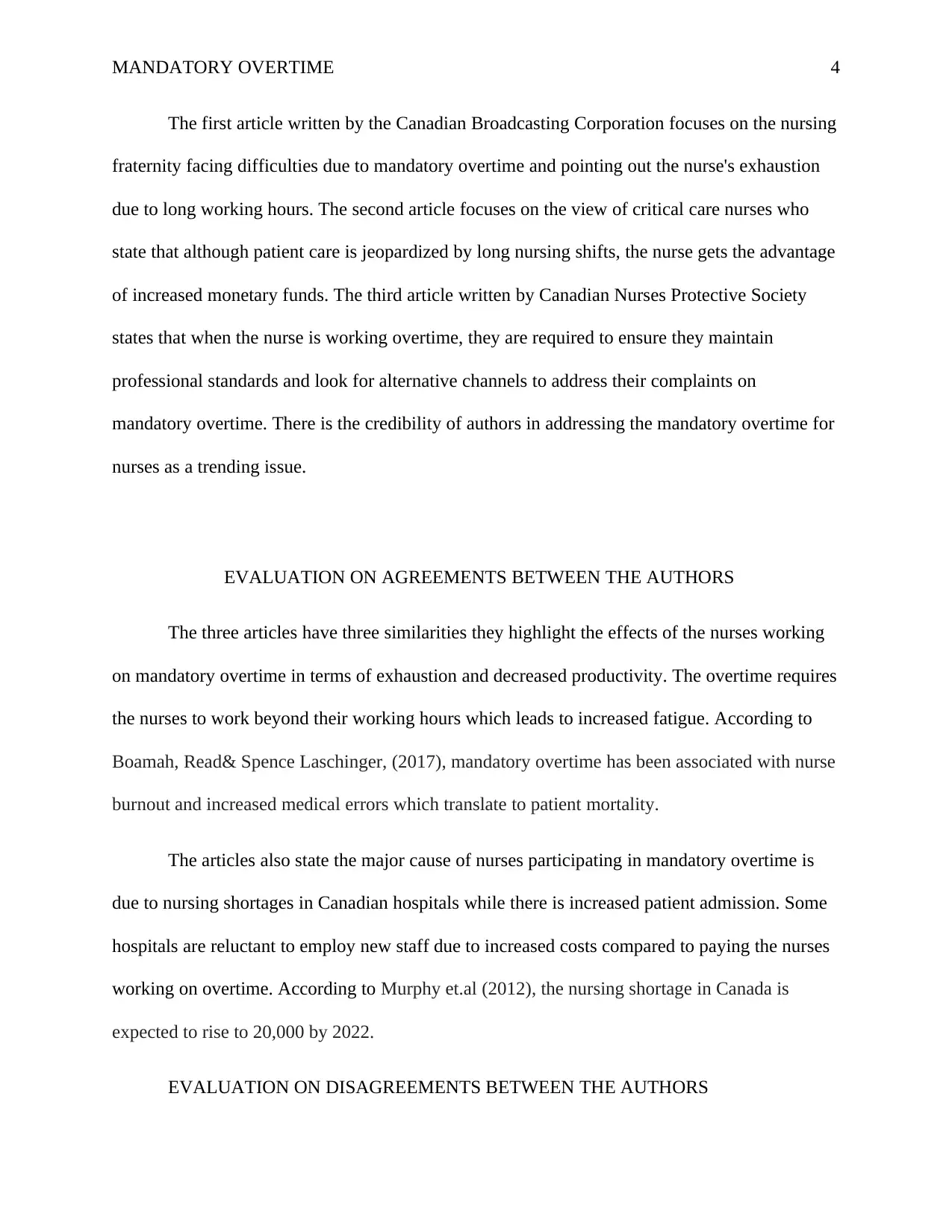
MANDATORY OVERTIME 4
The first article written by the Canadian Broadcasting Corporation focuses on the nursing
fraternity facing difficulties due to mandatory overtime and pointing out the nurse's exhaustion
due to long working hours. The second article focuses on the view of critical care nurses who
state that although patient care is jeopardized by long nursing shifts, the nurse gets the advantage
of increased monetary funds. The third article written by Canadian Nurses Protective Society
states that when the nurse is working overtime, they are required to ensure they maintain
professional standards and look for alternative channels to address their complaints on
mandatory overtime. There is the credibility of authors in addressing the mandatory overtime for
nurses as a trending issue.
EVALUATION ON AGREEMENTS BETWEEN THE AUTHORS
The three articles have three similarities they highlight the effects of the nurses working
on mandatory overtime in terms of exhaustion and decreased productivity. The overtime requires
the nurses to work beyond their working hours which leads to increased fatigue. According to
Boamah, Read& Spence Laschinger, (2017), mandatory overtime has been associated with nurse
burnout and increased medical errors which translate to patient mortality.
The articles also state the major cause of nurses participating in mandatory overtime is
due to nursing shortages in Canadian hospitals while there is increased patient admission. Some
hospitals are reluctant to employ new staff due to increased costs compared to paying the nurses
working on overtime. According to Murphy et.al (2012), the nursing shortage in Canada is
expected to rise to 20,000 by 2022.
EVALUATION ON DISAGREEMENTS BETWEEN THE AUTHORS
The first article written by the Canadian Broadcasting Corporation focuses on the nursing
fraternity facing difficulties due to mandatory overtime and pointing out the nurse's exhaustion
due to long working hours. The second article focuses on the view of critical care nurses who
state that although patient care is jeopardized by long nursing shifts, the nurse gets the advantage
of increased monetary funds. The third article written by Canadian Nurses Protective Society
states that when the nurse is working overtime, they are required to ensure they maintain
professional standards and look for alternative channels to address their complaints on
mandatory overtime. There is the credibility of authors in addressing the mandatory overtime for
nurses as a trending issue.
EVALUATION ON AGREEMENTS BETWEEN THE AUTHORS
The three articles have three similarities they highlight the effects of the nurses working
on mandatory overtime in terms of exhaustion and decreased productivity. The overtime requires
the nurses to work beyond their working hours which leads to increased fatigue. According to
Boamah, Read& Spence Laschinger, (2017), mandatory overtime has been associated with nurse
burnout and increased medical errors which translate to patient mortality.
The articles also state the major cause of nurses participating in mandatory overtime is
due to nursing shortages in Canadian hospitals while there is increased patient admission. Some
hospitals are reluctant to employ new staff due to increased costs compared to paying the nurses
working on overtime. According to Murphy et.al (2012), the nursing shortage in Canada is
expected to rise to 20,000 by 2022.
EVALUATION ON DISAGREEMENTS BETWEEN THE AUTHORS
Paraphrase This Document
Need a fresh take? Get an instant paraphrase of this document with our AI Paraphraser
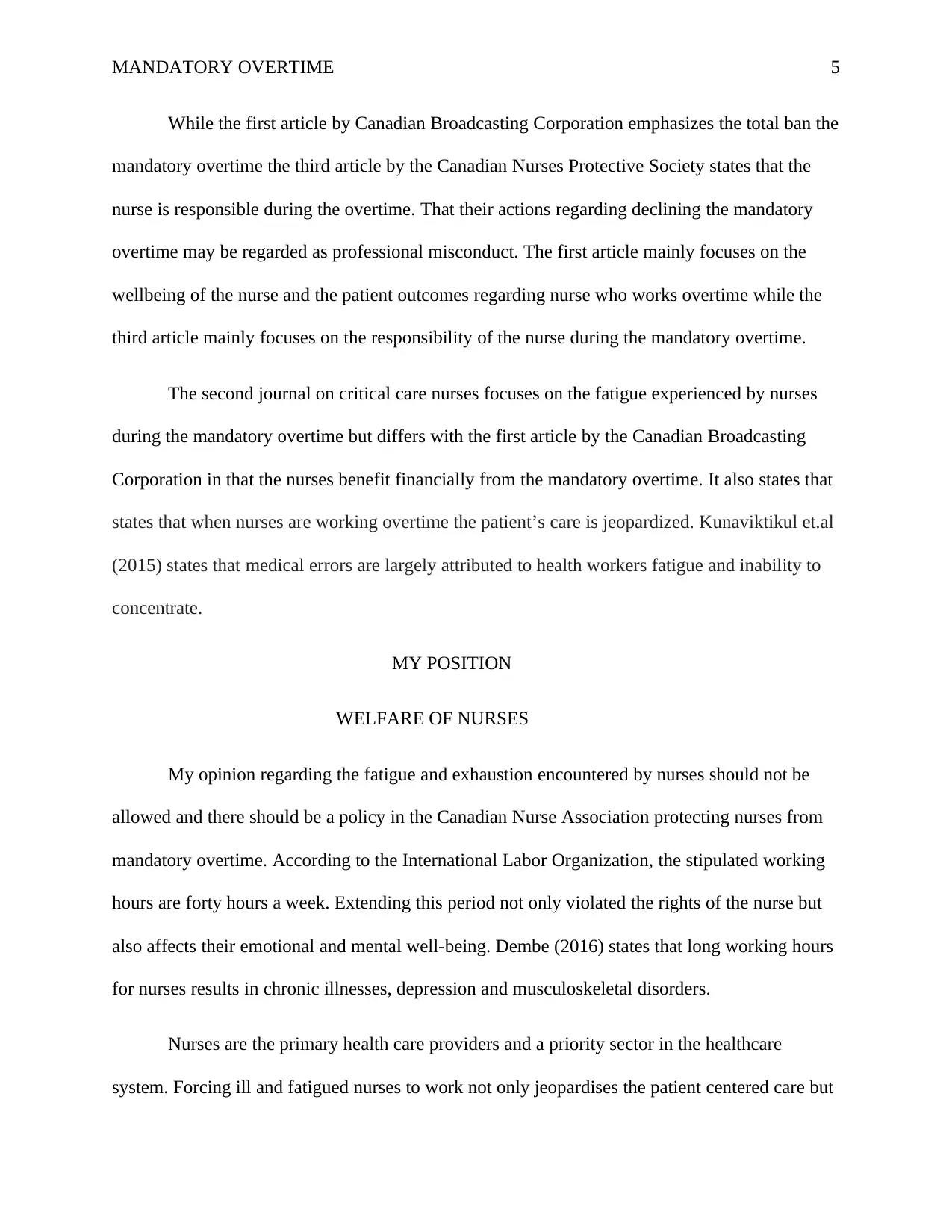
MANDATORY OVERTIME 5
While the first article by Canadian Broadcasting Corporation emphasizes the total ban the
mandatory overtime the third article by the Canadian Nurses Protective Society states that the
nurse is responsible during the overtime. That their actions regarding declining the mandatory
overtime may be regarded as professional misconduct. The first article mainly focuses on the
wellbeing of the nurse and the patient outcomes regarding nurse who works overtime while the
third article mainly focuses on the responsibility of the nurse during the mandatory overtime.
The second journal on critical care nurses focuses on the fatigue experienced by nurses
during the mandatory overtime but differs with the first article by the Canadian Broadcasting
Corporation in that the nurses benefit financially from the mandatory overtime. It also states that
states that when nurses are working overtime the patient’s care is jeopardized. Kunaviktikul et.al
(2015) states that medical errors are largely attributed to health workers fatigue and inability to
concentrate.
MY POSITION
WELFARE OF NURSES
My opinion regarding the fatigue and exhaustion encountered by nurses should not be
allowed and there should be a policy in the Canadian Nurse Association protecting nurses from
mandatory overtime. According to the International Labor Organization, the stipulated working
hours are forty hours a week. Extending this period not only violated the rights of the nurse but
also affects their emotional and mental well-being. Dembe (2016) states that long working hours
for nurses results in chronic illnesses, depression and musculoskeletal disorders.
Nurses are the primary health care providers and a priority sector in the healthcare
system. Forcing ill and fatigued nurses to work not only jeopardises the patient centered care but
While the first article by Canadian Broadcasting Corporation emphasizes the total ban the
mandatory overtime the third article by the Canadian Nurses Protective Society states that the
nurse is responsible during the overtime. That their actions regarding declining the mandatory
overtime may be regarded as professional misconduct. The first article mainly focuses on the
wellbeing of the nurse and the patient outcomes regarding nurse who works overtime while the
third article mainly focuses on the responsibility of the nurse during the mandatory overtime.
The second journal on critical care nurses focuses on the fatigue experienced by nurses
during the mandatory overtime but differs with the first article by the Canadian Broadcasting
Corporation in that the nurses benefit financially from the mandatory overtime. It also states that
states that when nurses are working overtime the patient’s care is jeopardized. Kunaviktikul et.al
(2015) states that medical errors are largely attributed to health workers fatigue and inability to
concentrate.
MY POSITION
WELFARE OF NURSES
My opinion regarding the fatigue and exhaustion encountered by nurses should not be
allowed and there should be a policy in the Canadian Nurse Association protecting nurses from
mandatory overtime. According to the International Labor Organization, the stipulated working
hours are forty hours a week. Extending this period not only violated the rights of the nurse but
also affects their emotional and mental well-being. Dembe (2016) states that long working hours
for nurses results in chronic illnesses, depression and musculoskeletal disorders.
Nurses are the primary health care providers and a priority sector in the healthcare
system. Forcing ill and fatigued nurses to work not only jeopardises the patient centered care but
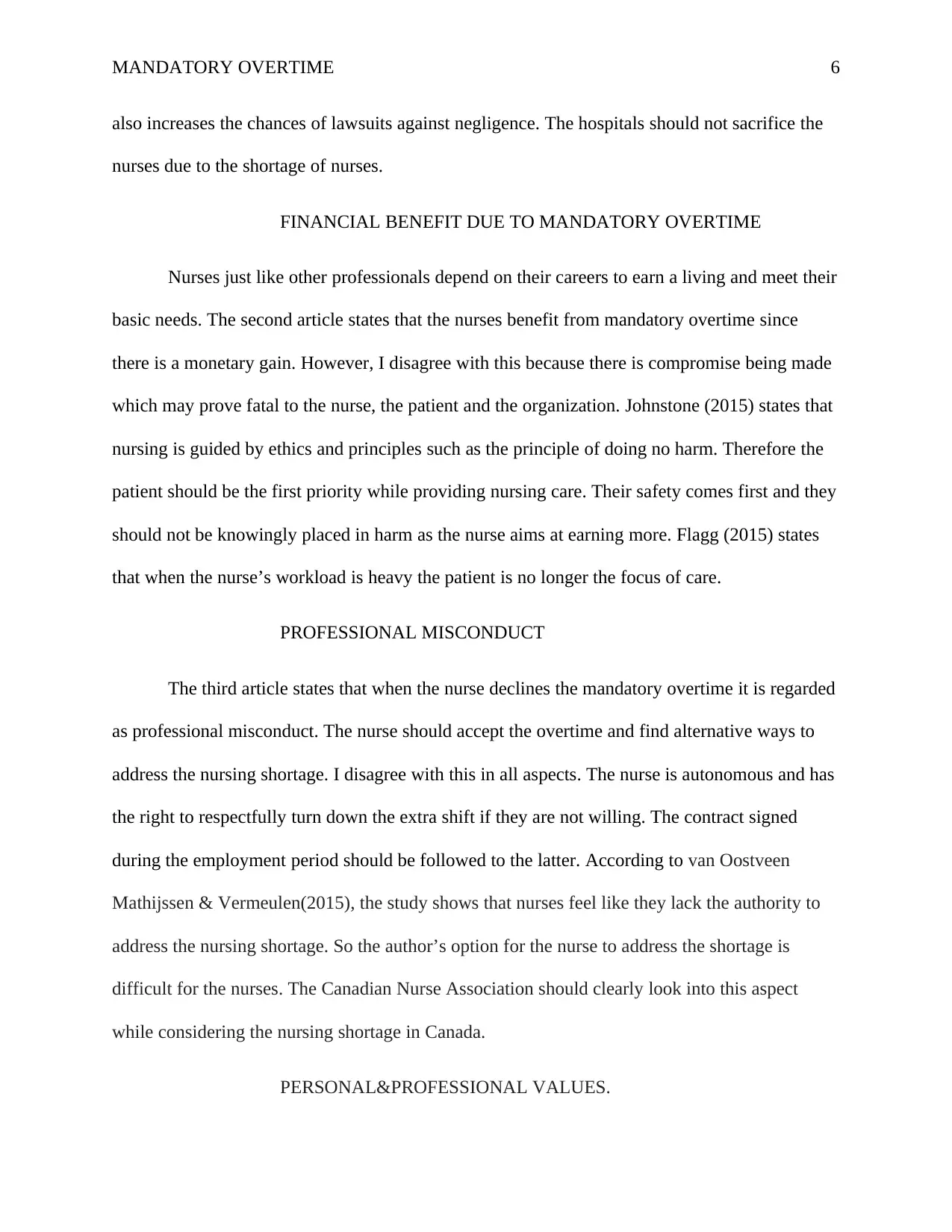
MANDATORY OVERTIME 6
also increases the chances of lawsuits against negligence. The hospitals should not sacrifice the
nurses due to the shortage of nurses.
FINANCIAL BENEFIT DUE TO MANDATORY OVERTIME
Nurses just like other professionals depend on their careers to earn a living and meet their
basic needs. The second article states that the nurses benefit from mandatory overtime since
there is a monetary gain. However, I disagree with this because there is compromise being made
which may prove fatal to the nurse, the patient and the organization. Johnstone (2015) states that
nursing is guided by ethics and principles such as the principle of doing no harm. Therefore the
patient should be the first priority while providing nursing care. Their safety comes first and they
should not be knowingly placed in harm as the nurse aims at earning more. Flagg (2015) states
that when the nurse’s workload is heavy the patient is no longer the focus of care.
PROFESSIONAL MISCONDUCT
The third article states that when the nurse declines the mandatory overtime it is regarded
as professional misconduct. The nurse should accept the overtime and find alternative ways to
address the nursing shortage. I disagree with this in all aspects. The nurse is autonomous and has
the right to respectfully turn down the extra shift if they are not willing. The contract signed
during the employment period should be followed to the latter. According to van Oostveen
Mathijssen & Vermeulen(2015), the study shows that nurses feel like they lack the authority to
address the nursing shortage. So the author’s option for the nurse to address the shortage is
difficult for the nurses. The Canadian Nurse Association should clearly look into this aspect
while considering the nursing shortage in Canada.
PERSONAL&PROFESSIONAL VALUES.
also increases the chances of lawsuits against negligence. The hospitals should not sacrifice the
nurses due to the shortage of nurses.
FINANCIAL BENEFIT DUE TO MANDATORY OVERTIME
Nurses just like other professionals depend on their careers to earn a living and meet their
basic needs. The second article states that the nurses benefit from mandatory overtime since
there is a monetary gain. However, I disagree with this because there is compromise being made
which may prove fatal to the nurse, the patient and the organization. Johnstone (2015) states that
nursing is guided by ethics and principles such as the principle of doing no harm. Therefore the
patient should be the first priority while providing nursing care. Their safety comes first and they
should not be knowingly placed in harm as the nurse aims at earning more. Flagg (2015) states
that when the nurse’s workload is heavy the patient is no longer the focus of care.
PROFESSIONAL MISCONDUCT
The third article states that when the nurse declines the mandatory overtime it is regarded
as professional misconduct. The nurse should accept the overtime and find alternative ways to
address the nursing shortage. I disagree with this in all aspects. The nurse is autonomous and has
the right to respectfully turn down the extra shift if they are not willing. The contract signed
during the employment period should be followed to the latter. According to van Oostveen
Mathijssen & Vermeulen(2015), the study shows that nurses feel like they lack the authority to
address the nursing shortage. So the author’s option for the nurse to address the shortage is
difficult for the nurses. The Canadian Nurse Association should clearly look into this aspect
while considering the nursing shortage in Canada.
PERSONAL&PROFESSIONAL VALUES.
⊘ This is a preview!⊘
Do you want full access?
Subscribe today to unlock all pages.

Trusted by 1+ million students worldwide
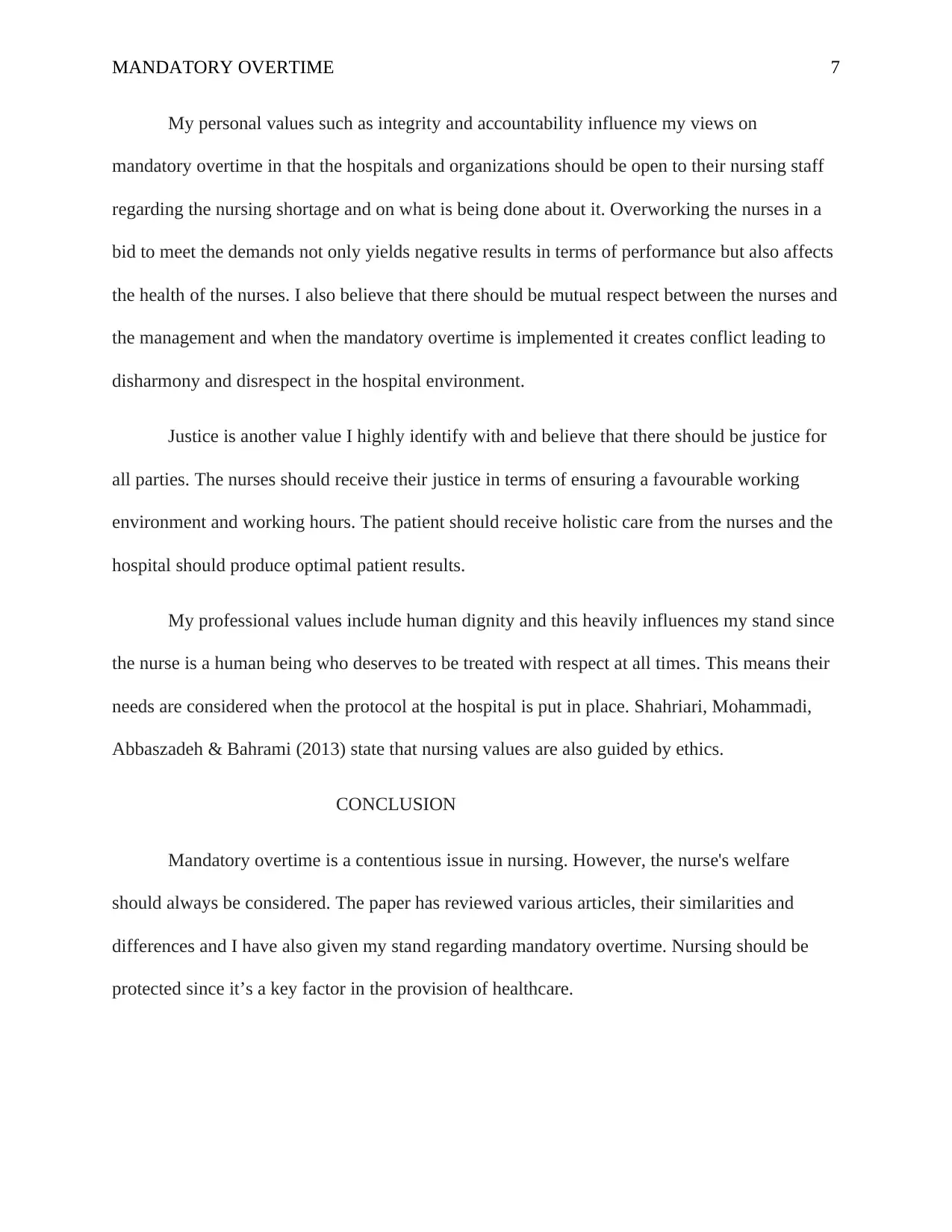
MANDATORY OVERTIME 7
My personal values such as integrity and accountability influence my views on
mandatory overtime in that the hospitals and organizations should be open to their nursing staff
regarding the nursing shortage and on what is being done about it. Overworking the nurses in a
bid to meet the demands not only yields negative results in terms of performance but also affects
the health of the nurses. I also believe that there should be mutual respect between the nurses and
the management and when the mandatory overtime is implemented it creates conflict leading to
disharmony and disrespect in the hospital environment.
Justice is another value I highly identify with and believe that there should be justice for
all parties. The nurses should receive their justice in terms of ensuring a favourable working
environment and working hours. The patient should receive holistic care from the nurses and the
hospital should produce optimal patient results.
My professional values include human dignity and this heavily influences my stand since
the nurse is a human being who deserves to be treated with respect at all times. This means their
needs are considered when the protocol at the hospital is put in place. Shahriari, Mohammadi,
Abbaszadeh & Bahrami (2013) state that nursing values are also guided by ethics.
CONCLUSION
Mandatory overtime is a contentious issue in nursing. However, the nurse's welfare
should always be considered. The paper has reviewed various articles, their similarities and
differences and I have also given my stand regarding mandatory overtime. Nursing should be
protected since it’s a key factor in the provision of healthcare.
My personal values such as integrity and accountability influence my views on
mandatory overtime in that the hospitals and organizations should be open to their nursing staff
regarding the nursing shortage and on what is being done about it. Overworking the nurses in a
bid to meet the demands not only yields negative results in terms of performance but also affects
the health of the nurses. I also believe that there should be mutual respect between the nurses and
the management and when the mandatory overtime is implemented it creates conflict leading to
disharmony and disrespect in the hospital environment.
Justice is another value I highly identify with and believe that there should be justice for
all parties. The nurses should receive their justice in terms of ensuring a favourable working
environment and working hours. The patient should receive holistic care from the nurses and the
hospital should produce optimal patient results.
My professional values include human dignity and this heavily influences my stand since
the nurse is a human being who deserves to be treated with respect at all times. This means their
needs are considered when the protocol at the hospital is put in place. Shahriari, Mohammadi,
Abbaszadeh & Bahrami (2013) state that nursing values are also guided by ethics.
CONCLUSION
Mandatory overtime is a contentious issue in nursing. However, the nurse's welfare
should always be considered. The paper has reviewed various articles, their similarities and
differences and I have also given my stand regarding mandatory overtime. Nursing should be
protected since it’s a key factor in the provision of healthcare.
Paraphrase This Document
Need a fresh take? Get an instant paraphrase of this document with our AI Paraphraser
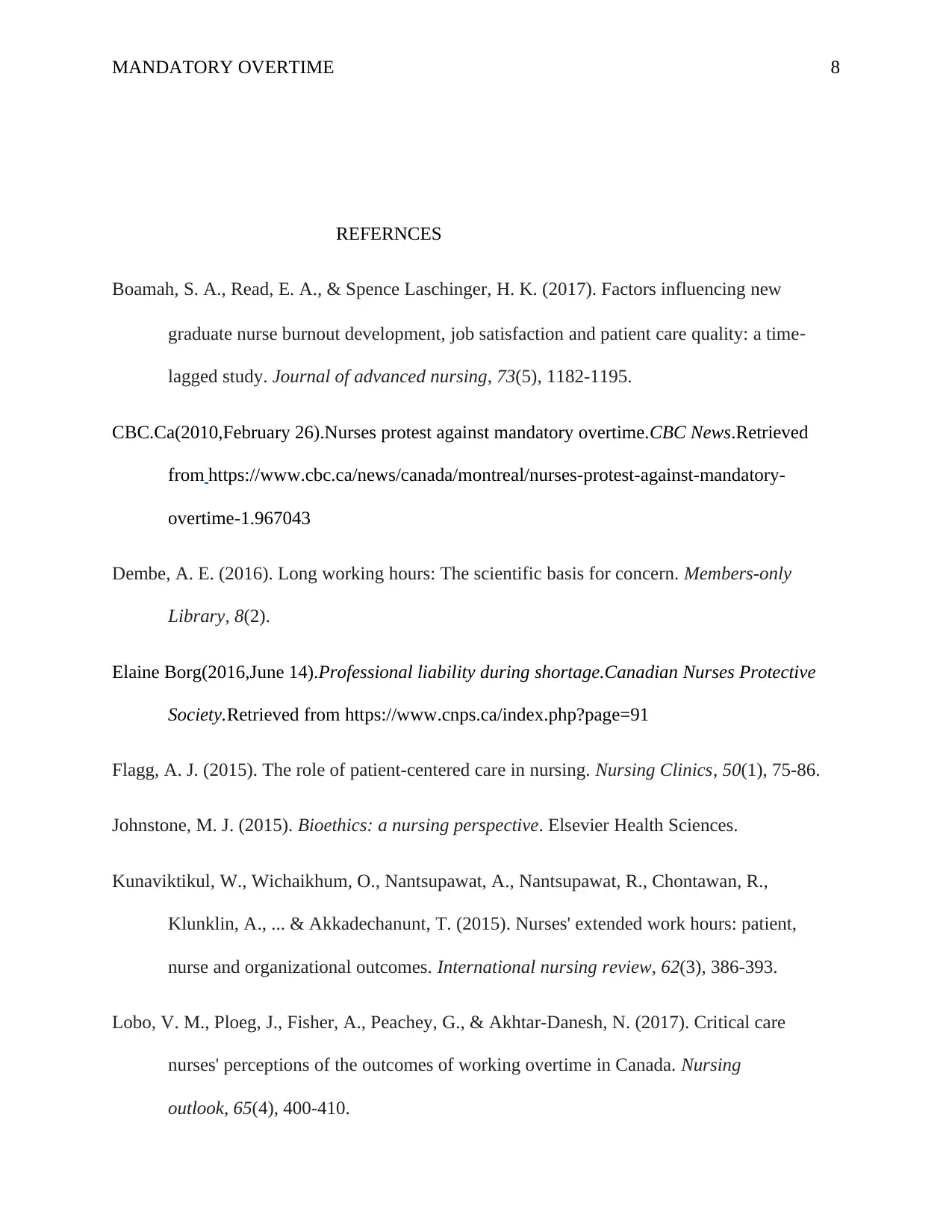
MANDATORY OVERTIME 8
REFERNCES
Boamah, S. A., Read, E. A., & Spence Laschinger, H. K. (2017). Factors influencing new
graduate nurse burnout development, job satisfaction and patient care quality: a time‐
lagged study. Journal of advanced nursing, 73(5), 1182-1195.
CBC.Ca(2010,February 26).Nurses protest against mandatory overtime.CBC News.Retrieved
from https://www.cbc.ca/news/canada/montreal/nurses-protest-against-mandatory-
overtime-1.967043
Dembe, A. E. (2016). Long working hours: The scientific basis for concern. Members-only
Library, 8(2).
Elaine Borg(2016,June 14).Professional liability during shortage.Canadian Nurses Protective
Society.Retrieved from https://www.cnps.ca/index.php?page=91
Flagg, A. J. (2015). The role of patient-centered care in nursing. Nursing Clinics, 50(1), 75-86.
Johnstone, M. J. (2015). Bioethics: a nursing perspective. Elsevier Health Sciences.
Kunaviktikul, W., Wichaikhum, O., Nantsupawat, A., Nantsupawat, R., Chontawan, R.,
Klunklin, A., ... & Akkadechanunt, T. (2015). Nurses' extended work hours: patient,
nurse and organizational outcomes. International nursing review, 62(3), 386-393.
Lobo, V. M., Ploeg, J., Fisher, A., Peachey, G., & Akhtar-Danesh, N. (2017). Critical care
nurses' perceptions of the outcomes of working overtime in Canada. Nursing
outlook, 65(4), 400-410.
REFERNCES
Boamah, S. A., Read, E. A., & Spence Laschinger, H. K. (2017). Factors influencing new
graduate nurse burnout development, job satisfaction and patient care quality: a time‐
lagged study. Journal of advanced nursing, 73(5), 1182-1195.
CBC.Ca(2010,February 26).Nurses protest against mandatory overtime.CBC News.Retrieved
from https://www.cbc.ca/news/canada/montreal/nurses-protest-against-mandatory-
overtime-1.967043
Dembe, A. E. (2016). Long working hours: The scientific basis for concern. Members-only
Library, 8(2).
Elaine Borg(2016,June 14).Professional liability during shortage.Canadian Nurses Protective
Society.Retrieved from https://www.cnps.ca/index.php?page=91
Flagg, A. J. (2015). The role of patient-centered care in nursing. Nursing Clinics, 50(1), 75-86.
Johnstone, M. J. (2015). Bioethics: a nursing perspective. Elsevier Health Sciences.
Kunaviktikul, W., Wichaikhum, O., Nantsupawat, A., Nantsupawat, R., Chontawan, R.,
Klunklin, A., ... & Akkadechanunt, T. (2015). Nurses' extended work hours: patient,
nurse and organizational outcomes. International nursing review, 62(3), 386-393.
Lobo, V. M., Ploeg, J., Fisher, A., Peachey, G., & Akhtar-Danesh, N. (2017). Critical care
nurses' perceptions of the outcomes of working overtime in Canada. Nursing
outlook, 65(4), 400-410.
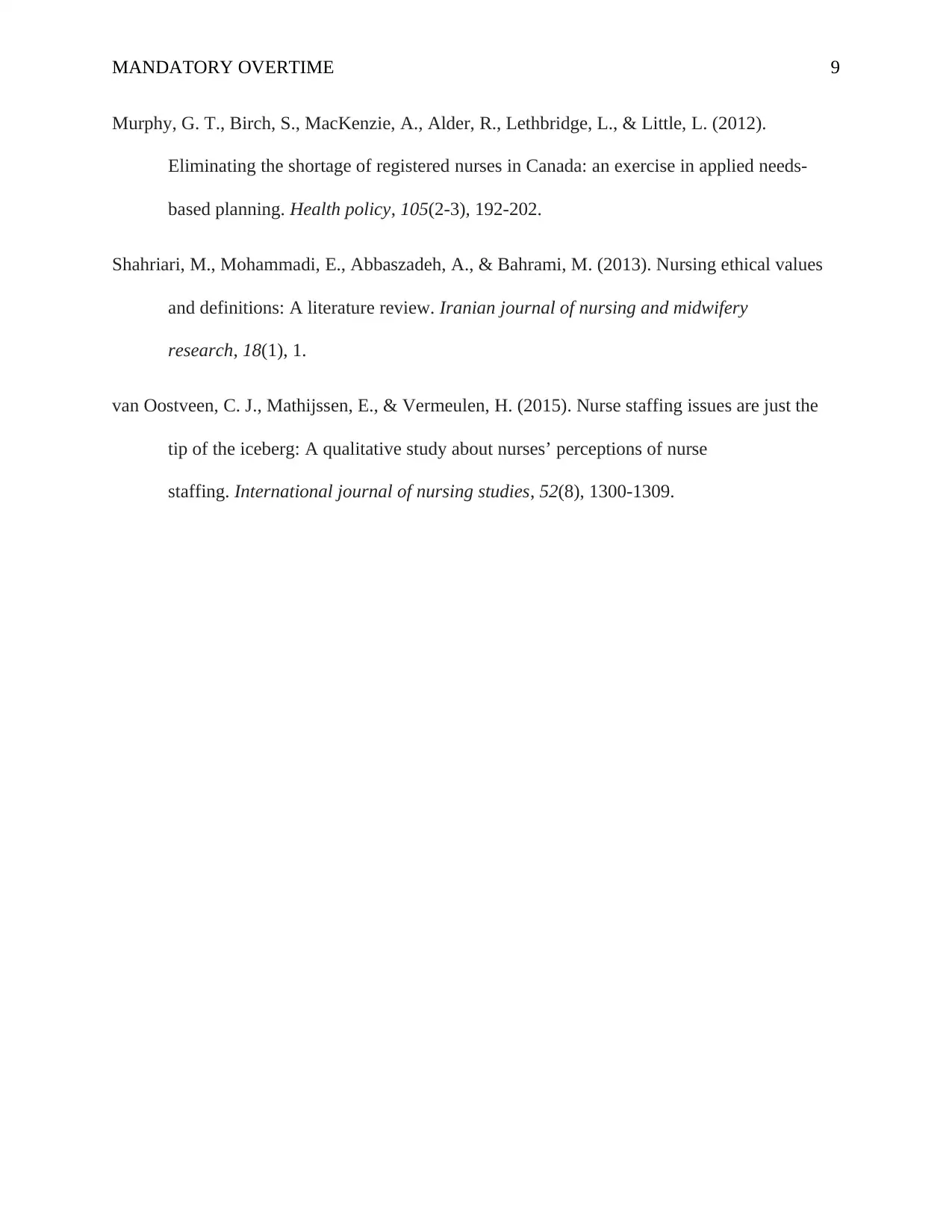
MANDATORY OVERTIME 9
Murphy, G. T., Birch, S., MacKenzie, A., Alder, R., Lethbridge, L., & Little, L. (2012).
Eliminating the shortage of registered nurses in Canada: an exercise in applied needs-
based planning. Health policy, 105(2-3), 192-202.
Shahriari, M., Mohammadi, E., Abbaszadeh, A., & Bahrami, M. (2013). Nursing ethical values
and definitions: A literature review. Iranian journal of nursing and midwifery
research, 18(1), 1.
van Oostveen, C. J., Mathijssen, E., & Vermeulen, H. (2015). Nurse staffing issues are just the
tip of the iceberg: A qualitative study about nurses’ perceptions of nurse
staffing. International journal of nursing studies, 52(8), 1300-1309.
Murphy, G. T., Birch, S., MacKenzie, A., Alder, R., Lethbridge, L., & Little, L. (2012).
Eliminating the shortage of registered nurses in Canada: an exercise in applied needs-
based planning. Health policy, 105(2-3), 192-202.
Shahriari, M., Mohammadi, E., Abbaszadeh, A., & Bahrami, M. (2013). Nursing ethical values
and definitions: A literature review. Iranian journal of nursing and midwifery
research, 18(1), 1.
van Oostveen, C. J., Mathijssen, E., & Vermeulen, H. (2015). Nurse staffing issues are just the
tip of the iceberg: A qualitative study about nurses’ perceptions of nurse
staffing. International journal of nursing studies, 52(8), 1300-1309.
⊘ This is a preview!⊘
Do you want full access?
Subscribe today to unlock all pages.

Trusted by 1+ million students worldwide
1 out of 9
Related Documents
Your All-in-One AI-Powered Toolkit for Academic Success.
+13062052269
info@desklib.com
Available 24*7 on WhatsApp / Email
![[object Object]](/_next/static/media/star-bottom.7253800d.svg)
Unlock your academic potential
Copyright © 2020–2026 A2Z Services. All Rights Reserved. Developed and managed by ZUCOL.





